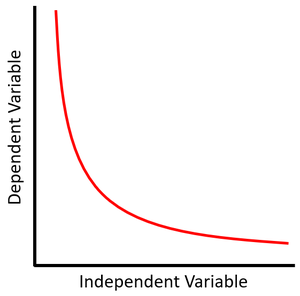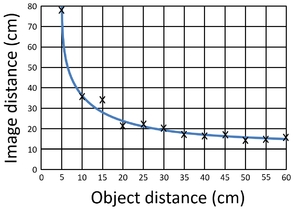Difference between revisions of "Inversely Proportional"
(Created page with "==Key Stage 4== ===Meaning=== When two variables are '''inversely proportional''' when one variable gets larger, the other variable gets smaller. ===About Inverse...") |
|||
| (2 intermediate revisions by the same user not shown) | |||
| Line 18: | Line 18: | ||
| style="height:20px; width:200px; text-align:center;" |This [[Scatter Graph|scatter graph]] of [[Image Distance]] against [[Object Distance]] of a [[Lens]] begins with a steep negative [[gradient]] which becomes more shallow until the [[gradient]] is almost zero. The relationship is '''inversely proportional'''. | | style="height:20px; width:200px; text-align:center;" |This [[Scatter Graph|scatter graph]] of [[Image Distance]] against [[Object Distance]] of a [[Lens]] begins with a steep negative [[gradient]] which becomes more shallow until the [[gradient]] is almost zero. The relationship is '''inversely proportional'''. | ||
|} | |} | ||
| + | |||
| + | ===References=== | ||
| + | ====AQA==== | ||
| + | |||
| + | :[https://www.amazon.co.uk/gp/product/1782946403/ref=as_li_tl?ie=UTF8&camp=1634&creative=6738&creativeASIN=1782946403&linkCode=as2&tag=nrjc-21&linkId=32a0abb60dff015b15b50e9b1d7b4644 ''Inverse proportionality, page 164, GCSE Combined Science Trilogy; Physics, CGP, AQA ''] | ||
| + | :[https://www.amazon.co.uk/gp/product/1782945970/ref=as_li_tl?ie=UTF8&camp=1634&creative=6738&creativeASIN=1782945970&linkCode=as2&tag=nrjc-21&linkId=a120d24dcc7cc7a58192069a3aafc1d2 ''Inverse proportionality, pages 114, 196, GCSE Physics; The Complete 9-1 Course for AQA, CGP, AQA ''] | ||
| + | |||
| + | ====Edexcel==== | ||
| + | |||
| + | :[https://www.amazon.co.uk/gp/product/1292120207/ref=as_li_tl?ie=UTF8&camp=1634&creative=6738&creativeASIN=1292120207&linkCode=as2&tag=nrjc-21&linkId=22455ff53961978667722edaa64c0be5 ''Inversely proportional quantities, page 165, GCSE Biology, Pearson, Edexcel ''] | ||
| + | |||
| + | ====OCR==== | ||
| + | :[https://www.amazon.co.uk/gp/product/0198359837/ref=as_li_tl?ie=UTF8&camp=1634&creative=6738&creativeASIN=0198359837&linkCode=as2&tag=nrjc-21&linkId=3c4229e8b023b2b60768e7ea2307cc6f ''Inversely proportional, pages 36, Gateway GCSE Physics, Oxford, OCR ''] | ||
Latest revision as of 15:32, 13 December 2019
Contents
Key Stage 4
Meaning
When two variables are inversely proportional when one variable gets larger, the other variable gets smaller.
About Inverse Proportionality
- A scatter graph showing an inversely proportional relationship has a curved gradient.
- On an inversely proportional scatter graph when one variable increases, the other decreases but the change is not constant.
- The line of best fit on an inversely proportional graph will not cross either axis.
Examples
| This scatter graph shows that x is inversely proportional to y; as the magnitude of x increases the magnitude of y decreases. | This scatter graph of Image Distance against Object Distance of a Lens begins with a steep negative gradient which becomes more shallow until the gradient is almost zero. The relationship is inversely proportional. |
References
AQA
- Inverse proportionality, page 164, GCSE Combined Science Trilogy; Physics, CGP, AQA
- Inverse proportionality, pages 114, 196, GCSE Physics; The Complete 9-1 Course for AQA, CGP, AQA

